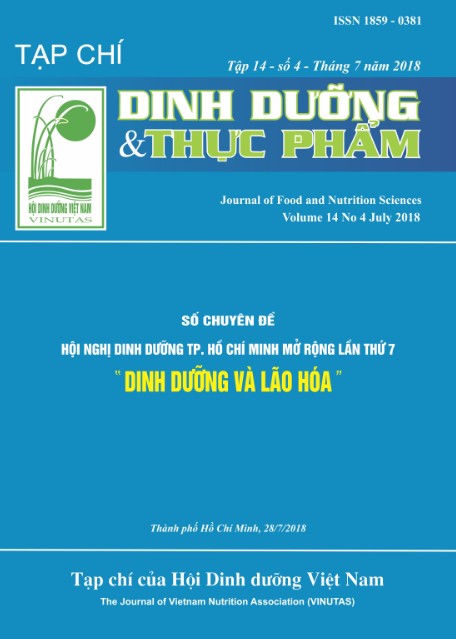NUTRITIONAL STATUS AND FEEDING REGIMEN AMONG PATIENTS HAVING GASTROINTESTINAL SURGERY IN DEPARTMENT OF SURGERY OF HANOI MEDICAL UNIVERSITY HOSPITAL 2016-2017
Main Article Content
Abstract
Objectives: To assess the nutritional status of the patients before and after surgery as
well as to describe the feeding regimen for 7 days after gastrointestinal surgery. Methods:
A cross-sectional study of 109 patients having gastrointestinal surgery at Department of
Surgery of Hanoi Medical University Hospital from October 2016 to December 2017.
Results: The prevalence of patients who had BMI <18.5 kg/m2 was 16.5%. Malnutrition
risk according to subjective overall rating with SGA level B and C was 38.5%. In the preoperative stage, the percentage of patients having decreased Serum Albumin and anemia
was 35.8% and 31.2%, respectively. During 7 days after the surgery, 81.6% of the patients
received combined intravenous and oral feeding, while 9.2% of the patients were fed intravenously. The esophageal surgery had the shortest oral feeding time (2.4 ± 1.5 d), while
the longest feeding time was for the small bowel surgery (4.0 ± 1.6 d). First day after the
surgery, the patient was fed intravenously with the average energy intake of 816.7 Kcal.
Over the following days, the total energy intake only accounted for 50 to 60% of the recommended demand. 8 days after the surgery, 98.1% of patients had weight loss, and 79.8%
lost less than 5% of their body weight. The proportion of patients with BMI smaller than
18.5 increased from 16.5% to 23.9%.
Keywords
Nutritional status, before and after surgery, gastrointestinal tract, feeding after surgery
Article Details
Similar Articles
- Nguyễn Mạnh Thắng, Nguyễn Công Khẩn, Trương Tuyết Mai, Nguyễn Đức Hạnh, TRIAL PRODUCTION OF EUPHORIA HIRTA L. EXTRACT DRINK , Vietnam Journal of Nutrition & Food: Vol. 15 No. 4 (2019)
You may also start an advanced similarity search for this article.


